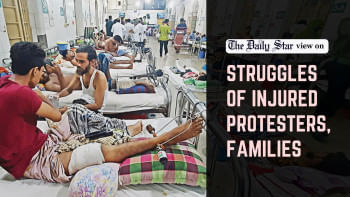July victims need mental health support

We are deeply concerned about the psychological well-being of those injured during the July-August uprising, as a survey has found that 75 percent of them are suffering from some form of mental health issues. The survey, conducted by the National Institute of Mental Health and Hospital, revealed that more than 27.3 percent of the injured—who are receiving treatment at the National Institute of Ophthalmology—are suffering from severe depression. Additionally, 54.5 percent are facing mild to very severe levels of anxiety, while 58.2 percent are exhibiting symptoms of stress or mental pressure. Although the survey was based on a small sample size, it provides valuable insights into how the injured are coping with their lives four months after the uprising.
Unfortunately, while we focus on their physical treatment, the issue of their mental well-being seems to be getting overlooked. Just imagine the psychological trauma faced by those who were once independent and living normal lives like us four months ago, only to find themselves permanently dependent on others after losing their eyesight and/or limbs. What kind of life awaits them? According to professionals at the National Institute of Mental Health and Hospital, almost all of those injured during the uprising or their relatives—those who have come to receive treatment at the institute—are suffering from bipolar disorder or post-traumatic stress disorder (PTSD). The events surrounding the movement have significantly impacted their mental health, which is deeply concerning.
We, therefore, urge the government to provide proper psychological assistance—such as counselling and therapy—to the injured. Since the majority of them are students and workers, it will be difficult for them to resume their education or work even after their treatment is complete. Thus, the government must develop a comprehensive rehabilitation plan for them. Reportedly, many of the injured have still not received proper treatment or the promised compensation of Tk 1 lakh from the July Smriti Foundation. Therefore, there is a need to expedite the disbursement of these funds.
We must never forget that it is through their sacrifices that the nation saw the end of a 15-year autocratic rule. They are the heroes of our nation, and the government must treat them as such by supporting them in every way possible. Alleviating the mental and physical trauma they are enduring is the least we can do for them.


 For all latest news, follow The Daily Star's Google News channel.
For all latest news, follow The Daily Star's Google News channel. 






Comments